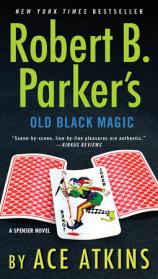Robert B. Parker's Old Black Magic: A Spenser Novel
Review
Robert B. Parker's Old Black Magic: A Spenser Novel
My first Spenser book was MORTAL STAKES. It was the third in what has now become an iconic series, so it was easy to catch up. Once I did, I was duty-bound to keep up. I mention this because time marches on. Robert B. Parker is no longer with us, but master scribe Ace Atkins picked up the baton and, with the publication of OLD BLACK MAGIC, has favored us with his seventh novel in the continuation of the series.
I will pay my highest compliment here and note that I often forget it is Atkins, not Parker, who has been behind the keyboard in recent years. This doesn’t mean that Atkins is slavishly imitating Parker and his style. No, there are some subtle changes here and there, some of which are portentous. This is not unexpected, given that the series is well into its fifth decade, and Spenser has to age at least a bit. More on that in a minute.
As for OLD BLACK MAGIC, one of the joys of having Atkins at the wheel of the franchise is the ability to take minor characters from earlier novels and elevate their stature, however temporarily. He does this to great effect here when Spenser, as a favor to a colleague with a terminal illness, becomes involved in the hunt for a trio of paintings that were stolen from a Boston museum two decades previously. The museum has started to receive letters indicating that a deal could be made for their return. Hawk, Spenser’s very capable friend and associate, is in South America on a frolic of his own, and Z, Spenser’s recently minted protégé, is in California.
"OLD BLACK MAGIC is pure Spenser, and pure Atkins, which means it doesn’t get any better than that."
Given the nature of the heist and the people who may have been responsible for it, Spenser recruits Vinnie Morris, an underworld associate with whom he has a long and tortuous history. Their relationship has been a bit more prickly of late, which provides a subtle undercurrent to the proceedings, as does the fact that the lynchpin of OLD BLACK MAGIC is a real-world art heist that occurred in Boston almost 30 years ago and remains unsolved to this day. The plot is a bit complex, what with the series of lies, double-crosses and dirty dealing that occurs not only among the principals involved on the wrong side of the law but also within the museum itself.
Spenser follows what is the coldest of trails with an unscrupulous British investigator right behind him. To his credit, Atkins makes it just difficult enough for Spenser to make his success --- depending on how you define “success” --- seem plausible. What ultimately propels the story, though, is Spenser’s inexorable forward movement when saddled with a difficult client, his motivation being to do the right thing on behalf of a longtime friend.
That said, the charm of OLD BLACK MAGIC is double-pronged and unrelated to the plot. The first element is that Atkins continues to elevate Henry Cimoli, the longtime crusty owner-operator of the Harbor Health Club, where Spenser hangs and bangs. Cimoli, who had been all but off the page before Atkins took the series wheel, says quite a bit in a few words. He doesn’t approve of Spenser’s dietary style, and I wonder if perhaps Atkins is hinting at a potential plot down the road where Spenser is brought down by a donut rather than a bullet.
The other is Atkins’ continuation and exacerbation of Parker’s display of Spenser’s classical education. Atkins goes deep and long with this, as Spenser tosses off pithy and always appropriate quotations from a couple of Shakespeare’s better- and lesser-known plays, as well as from such gone but not forgotten luminaries as Henry David Thoreau. It’s especially terrific when those at whom the remarks are directed are unable to even understand what he is talking about, let alone identify the source material.
OLD BLACK MAGIC is pure Spenser, and pure Atkins, which means it doesn’t get any better than that.
Reviewed by Joe Hartlaub on May 4, 2018




